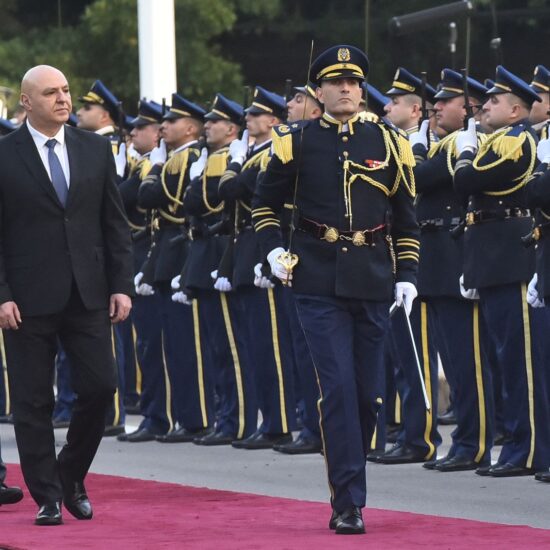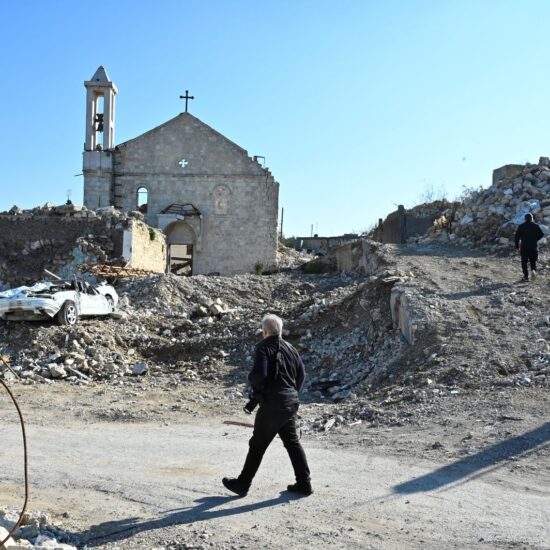
Olive harvesting has become a precarious task for Lebanese farmers residing in the Lebanese-border towns of South Lebanon. Although the region is renowned for its fruitful olive groves, their annual ritual has become a risky business due to rising regional tensions. The abundance provided by the olive trees is relied upon by many families as their main source of income.
This year olive harvesting season is under threat due to the looming war with Israel, adding to already vulnerable conditions for farmers in the surrounding towns.
What happens next in Gaza could jeopardize the whole country’s security structure, especially the south of Lebanon – a region that has suffered from several Israeli invasions in the past.
“During harvest season, families work together to help out on the land. The father and kids head to the field first from the early hours of the morning, soon joined by the mother who prepares a traditional breakfast and lunch to fuel us for the day,” Kareem Serhan, a farmer who owns an olive grove in Kfarkela, south Lebanon, told NOW.
“While it is hard work, it’s usually a joyous time, often accompanied by singing and blessings. This year, however, everything took a turn for the worse,” Serhan added.
According to Serhan, the majority of the residents of the village have left, afraid of a potential war breaking out between Israel and Hezbollah and expanding beyond the borders.
Practical challenges & an exodus of people leaving
On Lebanon’s southern border, conflicts often erupt between Israel and Hezbollah. For residents living in its vicinity, witnessing these clashes has become commonplace. However, the latest flare-up caused a sudden escalation of tensions and fear, making the situation increasingly volatile.
Farmers along the Lebanese border said that fighting has displaced workers who normally help with harvesting the olives.
Most people in Lebanon use the handpicking harvesting method to harvest their olives. It is a labor-intensive process but one that yields a better product, so a team of workers are needed every season to harvest the lands on time.
With some international awards, Lebanon has emerged among the countries producing extra virgin olive oil in a highly competitive sector, originating from towns in Southern Lebanon.
Agriculture and biodiversity engineer Hassan Badreddine said, “Many farmers in the South rely on the olive season for a financial boost, especially since Lebanese farmers have already suffered several setbacks in the past three years with the heavily dollarized market in the country that had affected their operation, production, and profits.”
“Time is not on their side as within a few weeks it will be too late to harvest and many olive mills in the area have shut their doors,” he added .
According to Badreddine, the olives are harvested at this time to maintain optimal flavor, PH, and aroma, but in villages closer to the border where there has been active shelling, farmers can no longer access their farms and have had to stop their harvests, wasting product and posing extra financial strains on them.
Their products may face significant exportation threats as well as disturbances in the logistic operations due to infrastructural damage in the event of a war, meaning that shipping their goods abroad may be a challenge.
“Our capability to produce olive oil was severely hindered in 2006 due to consistent shelling that obliterated our crops. Even today, our yield is not fully anything like what it was before then. If a war breaks out now, the consequences will likely outmatch anything we have previously experienced,” Serhan told NOW.
Loss of land
Abbas Al-Hajj Hassan, Lebanon’s Minister of Agriculture, has confirmed that more than 40,000 ancient olive trees were burnt by Israeli forces using the internationally banned white phosphorus bombs in recent attacks on Southern Lebanon. The Lebanese government, according to Al-Hajj Hassan will be taking its complaint to the United Nations, condemning their disapproval of Israel’s transgressions of borders and violations of international law.
Leftovers of cluster bombs fired by Israel during the 2006 war with Lebanon are still found to this day on lands in South Lebanon.
Villagers and deminers discovered unexploded cluster duds inside houses, in the streets, in gardens, on roofs, on patios, and hanging from trees and fences when they returned home, according to a Human Rights Watch Report on the 2006 war.
A farmer in the town of Deir Mimas told The New Arab that he was clearing the brush around his olive trees last month when he stumbled across the leftovers of a cluster bomb fired by Israel during the 2006 war.
Amnesty International has reported that airstrikes by Israeli forces containing white phosphorus shells have caused civilian injury in a southern Lebanese border village during this month.
White phosphorus is as a contentious incendiary weapon, and is forbidden under international law when launched within populated areas.
According to human rights advocates, it can ignite structures and cause deep burns on human skin that may harm internal organs or the respiratory system. Even minor burns from white phosphorus can ultimately deliver mortalities or infections to survivors, so farmers and labour workers have left their towns in fear of the expansion of such attacks.
Some villagers who live near the border anxiously monitor the news alert for any indications of escalating violence. They listen to the sounds of shelling, hoping that they will remain a safe distance away. But for other residents who are still able to access their land, an even greater sense of anxiety hangs over them as they hastily gather up their ripe olive harvest, petrified that the continuing conflict may ravage their crops.
Rodayna Raydan is a Lebanese-British journalist. You can follow her on Twitter @Rodayna_462.








